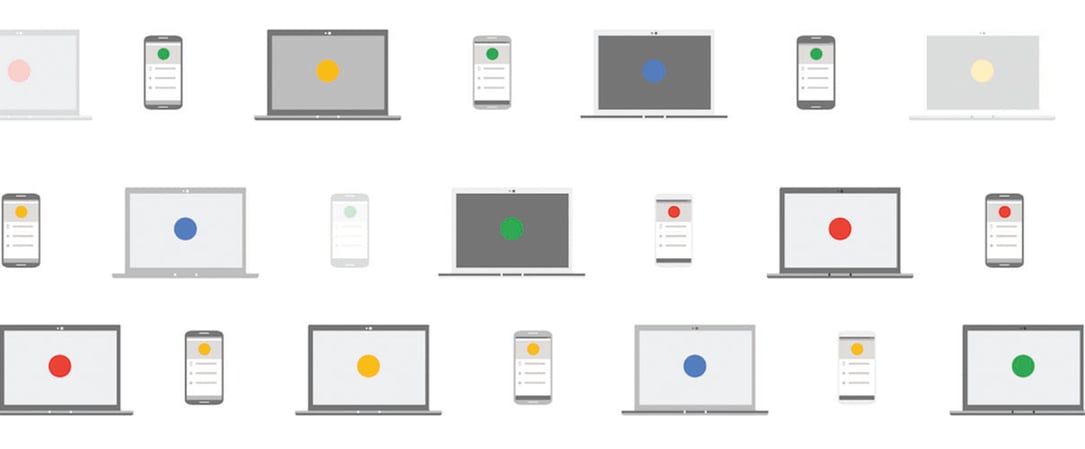 Sometimes the best way to dispel a myth is to start with a concrete example. Here's a great example from a client we worked with: QAD Inc. provides enterprise resource planning software and related enterprise software to manufacturing companies. By
rolling out Pixelbooks and adopting Grab and Go with Chrome Enterprise, QAD got their employees online faster, enhanced their productivity, virtually eliminated downtime, and increased security. Chrome Enterprise makes a great use case for a wide range of our customers, just like QAD. But often when we talk about Chrome to the uninitiated, we spend a lot of time clearing up confusion before we even get to the use case. We field questions like, "
Are we just talking about a web browser?" "
Would Chrome even work for my business with its lack of [security, management, fill in the blank]?" There’s a lot of misinformation swirling around what exactly Chrome is, and what it’s capable of. We’re here to clear a few things up for you. Let's start at the very beginning (we think it's a very good place to start) — by defining what we're talking about. 1)
Chromebooks are a type of computer designed to help you get things done faster and easier. They run Chrome OS, an operating system that has cloud storage, the best of Google built-in and multiple security layers. 2)
Google Chrome Enterprise is the business-focused solution for Chrome devices, Chrome browser and Chrome OS. Chrome Enterprise offers cloud-based management tools, integrations with third party products and 24/7 support for IT administrators. Here we debunk the five most common Chrome myths we encounter:
Sometimes the best way to dispel a myth is to start with a concrete example. Here's a great example from a client we worked with: QAD Inc. provides enterprise resource planning software and related enterprise software to manufacturing companies. By
rolling out Pixelbooks and adopting Grab and Go with Chrome Enterprise, QAD got their employees online faster, enhanced their productivity, virtually eliminated downtime, and increased security. Chrome Enterprise makes a great use case for a wide range of our customers, just like QAD. But often when we talk about Chrome to the uninitiated, we spend a lot of time clearing up confusion before we even get to the use case. We field questions like, "
Are we just talking about a web browser?" "
Would Chrome even work for my business with its lack of [security, management, fill in the blank]?" There’s a lot of misinformation swirling around what exactly Chrome is, and what it’s capable of. We’re here to clear a few things up for you. Let's start at the very beginning (we think it's a very good place to start) — by defining what we're talking about. 1)
Chromebooks are a type of computer designed to help you get things done faster and easier. They run Chrome OS, an operating system that has cloud storage, the best of Google built-in and multiple security layers. 2)
Google Chrome Enterprise is the business-focused solution for Chrome devices, Chrome browser and Chrome OS. Chrome Enterprise offers cloud-based management tools, integrations with third party products and 24/7 support for IT administrators. Here we debunk the five most common Chrome myths we encounter:
Myth #1: “Isn't Chrome really just a fancy browser?”
Raise your hand if you think of Chrome as an internet browser. Although the Chrome browser is an awesome tool utilized on Chromebooks, Chrome is much more than that. Chrome OS is a lightweight cloud-based operating system built around four pillars: speed, security, simplicity and shareability. So, while Chromebooks use the Chrome browser to run your favorite webapps, they can still run applications locally on your device by using Chrome optimized Android applications for Microsoft 365, Linux, Adobe Acrobat and more. And Chrome Enterprise meets business needs by combining the strengths of Chrome devices (such as Chromebooks and the Pixelbooks mentioned above), Chrome browser and Chrome OS.Myth #2: “Chromebook virus protection — Chromebooks aren't secure”
Widely considered to be the most secure operating system, Google Chrome has security built in at every level to provide end-to-end protection. From automatic updates and sandboxing,* to verified boot,** data encryption and recovery mode, Chrome OS can securely support employees across the enterprise. There's a review process required for all extensions and apps, and read-only protection means installed apps and extensions can't modify the Chromebook OS. In fact, Chrome users don’t need to maintain costly virus protection and other endpoint security software subscriptions, because Chrome OS protects, contains and repairs security threats all on its own. Don’t want to take our word for it? Here’s what former FBI most wanted hacker, Kevin Mitnick had to say on the security of Chrome OS:“I don’t know of any secure OS. In the past eight years, I’ve had 100 percent success at penetration testing on all of them. Wait, ChromeOS, ChromeOS is the most secure because of its very limited attack vector – there’s just nothing to exploit.”*Sandboxing - isolates any attack to a limited surface. **Verified boot - prevents a tampered device from boot-up.
Myth #3: “Chromebooks only work when they’re online”
In fact, as with other laptops, there are multiple options for workers to stay productive without internet access. Chromebooks offer offline access to Gmail, Calendar, Drive, Docs, Sheets and a number of offline-enabled Chrome and Android applications. Plus, because it’s a cloud-based OS, any changes you make in these applications will sync automatically the next time you connect to the internet, so you don’t have to worry about version control, ever. And, of course, there's always the option to tether your Chromebook; connecting to the internet via your cell phone's data.Myth #4: “Chromebooks can't run legacy applications”
Perhaps you've started your journey to the cloud, but are still running a few internal legacy applications. You don’t have to wait to move all these applications to the cloud to start capitalizing on the speed, simplicity, security and shareability of Chrome OS. Many organizations utilize virtual desktop infrastructure (VDI) solutions to give end users access to legacy applications. Chrome integrates with top VDI providers including Citrix, VMware and Amazon Workspaces and, in fact, VDI solutions often run much more quickly on a Chromebook due to the lightweight operating system and increased security. Support for VPN and SSO (Single-Sign On) also provides easy and seamless access to existing enterprise resources.Myth #5: “Chrome can't meet enterprise-level needs”
We've disproven some big myths about Chromebooks, but perhaps you're still not sure about managing each device on an enterprise level. You want to ensure all the proper software is installed and prevent users from installing harmful software or accessing things they shouldn’t. This is where Chromebooks and Chrome Enterprise work so well together.Chrome Enterprise and Device Management
Enterprise customers can manage their entire fleet of Chromebooks from a single cloud management console using Chrome Enterprise management. The console includes 200+ management policies. These include policies that follow specific users across devices, and those that are specific to a device(s). In the case of QAD, the zero-touch loaner program eased device management by eliminating the need for IT to deploy devices one by one. The Grab and Go application automatically tracks the status of the Chromebook loan — no asset tracking program or spreadsheet required. And, as soon as they log into the device, users have access to the apps and tools required for work immediately.Security
Google also makes security a major focus, as evidenced by tools such as theft prevention and advanced data safeguards. It's also possible to remotely disable a lost or stolen device. Another major advantage Chromebooks offer over their competitors is quick and easy updates. These provide several benefits:- Always ready to use — users won't experience any downtime as updates happen in the background while they work.
- Consistently up-to-date — users don't have to accept a prompt; updates happen automatically and seamlessly.
- Constantly improving — Google provides regular updates on a six-week schedule and immediately addresses any security issues.
On this page
Share this
Share this
More resources
Learn more about Pythian by reading the following blogs and articles.
An Introduction to Chrome Browser Management
![]()
An Introduction to Chrome Browser Management
Aug 9, 2020 12:00:00 AM
2
min read
Chrome Enterprise in Healthcare: Positively Impacting the End-User Experience


Chrome Enterprise in Healthcare: Positively Impacting the End-User Experience
Aug 5, 2020 12:00:00 AM
2
min read
How to Improve Healthcare Security With Google Chrome Security
![]()
How to Improve Healthcare Security With Google Chrome Security
Aug 5, 2020 12:00:00 AM
2
min read
Ready to unlock value from your data?
With Pythian, you can accomplish your data transformation goals and more.
